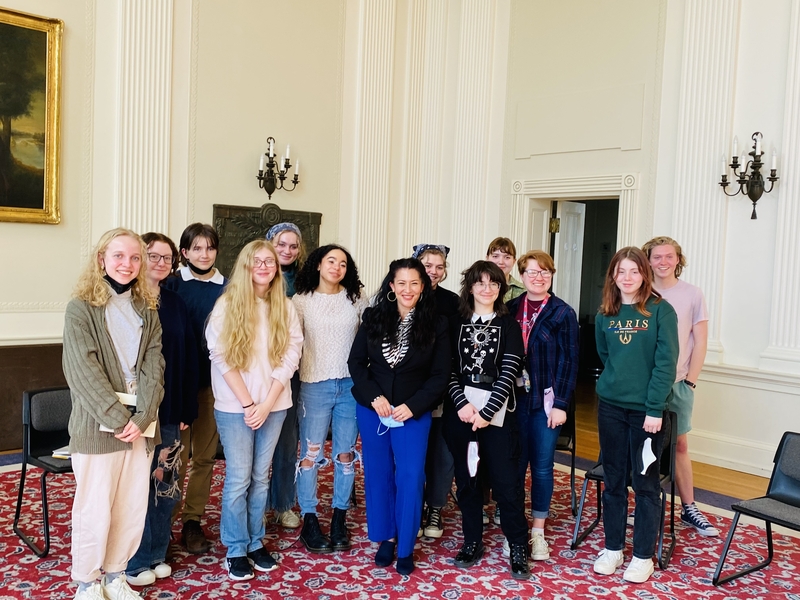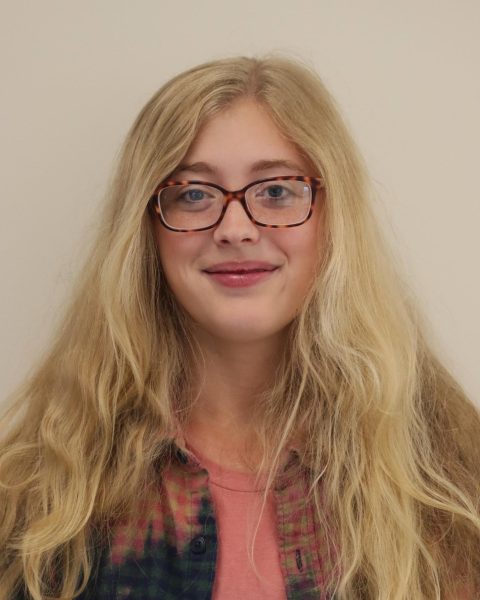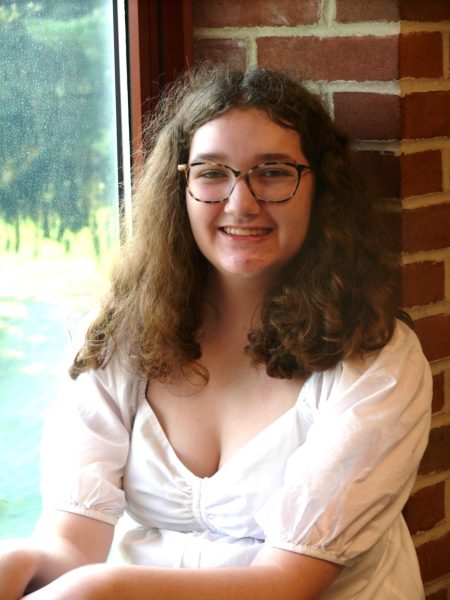Poet Laureate Ada Limón Visits Carlisle
Carlisle High School students pictured with Poet Laureate Ada Limón during her visit to Dickinson College .
March 9, 2023
A paragon of poetic success arrived in Carlisle on February 15th to meet with Carlisle and Dickinson College students. Poet Laureate Ada Limón now has a total of six published works, several of which have won notable awards. The Hurting Kind, which student participants read and analyzed, is the first collection published by Limón since the beginning of 2020’s COVID quarantine, making some of the metaphors used applicable to that situation, although that is certainly not the main focus. In fact, there isn’t just one specified topic. Her collection explores anything and everything that could have flitted through a person’s mind during the last few years, including loneliness, nature and the longing to be in it, family, memories, and much more.
Limón has remarked that the context of when this poetry was written influenced some of the content, but primarily she focused on writing about anything she deemed important. This is not an uncommon practice in poetry, but the fact that Limón starts in Spring rather than the more traditional winter is unique and symbolic of the tone she takes for the rest of the collection.
Ove the years, Limón has received a plethora of awards and honors for her works, her most recent being Dickinson College’s Stellfox award. Her designation as a Stellfox Scholar was the impetus for her invitation to Dickinson College to speak and give advice to young literature students.
A few weeks prior, faculty in the Dickinson creative writing community held an event at Dickinson’s Waidner-Spahr library to discuss The Hurting Kind and share thoughts, interpretations, or criticisms on the text. The event was held on January 30th, involving a number of students, both from Carlisle High School and those of Dickinson’s writing program. After a warm welcome with a small selection of refreshments provided by the library staff, attendees were divided into small groups throughout the library to discuss The Hurting Kind in a more direct setting with a professor for each group.
Then on February 15th, Ada Limón spoke at Dickinson, where the bright day’s sun shone onto a fantastically illuminating Q&A session. This event featured a mix of students from Dickinson’s student body as well as CHS’s, all of whom were encouraged to participate by asking questions. This was a rare and extremely valuable opportunity for the young writers, allowing them to pick the mind of an experienced, successful poet. A particularly favored topic of Limón’s was brought up, the concept of breath in poetry being applicable in both written and spoken poems. She described it similarly to her ideas in her interview with Alex Deuben of “The Million,” relating breath to stanza endings and the signals they present on how to read the poem.
Limón shared several pieces of invaluable advice with the students; when asked about her poetic inspirations, she was quick to mention poets Emily Dickinson, Gabriela Minel, Juliana De La Cruz and others. Naturally, some of the students wanted her advice on some of the logistics of creative writing, both in poetry and other forms. Limón explained that her poems often come in snippets of memories, as a way to work through those memories and heal. When asked the famous question about how to get inspiration to write, she encouraged the student writers to use their inner critics as a method of self exploration.
Limón also articulated an idea surrounding poetry and how it has developed, especially in the Western world. She feels as though poets’ and authors’ bending of the world into our own literary lenses is a kind of colonization not dissimilar to what has been done to other facets of nature by humanity. “We as writers have colonized nature the same way man has- we use it for metaphors, for ourselves.” Such as in her poem Privacy, where she struggles with her poetic urge to personify a pair of crows, to ‘make them into something they are not’. She mentioned something similar in the Q&A, about the importance of, “…trying to understand how to witness something and not make it my own…”.
Throughout the Q&A, specific questions about Limón’s choices in The Hurting Kind were answered. One of the more notable features of the book, its organization into the four seasons, was explained as a desire to allow the book to continue even after the final page; “I wanted a sense of continuation. I wanted it to be able to begin again. I wanted to remove myself from the narrative…the subject of the poem(s).”. A college student asked about the significance of the final poem in the collection, The End of Poetry. To this, Limón explained that before and during writing The End of Poetry, she felt a deep sense of simply being tired of writing, which is a common occurrence with artists. However, in response to this exhaustion, Limón said that she “…pushed against the art, and then realized because of the pushing the beauty of it.”. In one of the last questions, another college student asked about the specific style that Limón believes she uses in her poetry, to which she responded that “Nature, sounds, an apology, and an ‘I want’… sum up my poetry pretty well,” which received amicable laughter from everyone.
Ada Limón’s work and success has been felt throughout the poetry community. Her passion for nature and improving the world around her has inspired many, and will hopefully continue to do so both in her time as Poet Laureate and throughout the rest of her career. The Hurting Kind’s focus on family lends itself well to comforting and communicating with people, especially so recently after the pandemic and months inside, alone. Limón’s incredible kindness and intelligence shines through in both her writing and in her interactions with people, making her work one of many essential steps in repairing peoples’ connections with each other and the world around them.






























































































